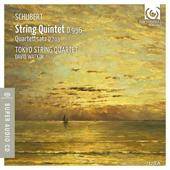
ESSENTIAL RECORDINGS

Over 100 recordings exist of the "Trout" Piano Quintet compared to just around 40 for this String Quintet in C major, D.956 written by
Franz Schubert during the last year of his life and published posthumously. A discrepancy that quite simply baffles me, because in my opinion, the String Quintet
is a far more superior piece of music than the Piano Quintet. It is one of those rare Schubert works that is on par with the chamber music of Beethoven, something that
Schubert had tried to achieve throughout all his life. Mind you it still lacks Beethoven's imagination and development skills, and exhibits Schubert's tendency towards
repetition, but some of the repeated lines and gestures in this piece are simply sublime. Schubert was still young when he died at the age of 31, but this masterpiece shows
a composer mature well beyond his years, with passages in the Adagio movement in particular loaded with profound ambiguity and inner struggle.
This is the kind of chamber music work that demands the musicians playing it, or should I say their instruments, perform a disappearing act. The musical idea, or statement,
is first and foremost. The instruments producing that statement are strictly a means to an end. Only by attaining a certain level of ensemble playing, can a group of musicians
embody the music's abstract concept and translate it into something more concrete for the listener. And that is something the Tokyo String Quartet, along
with cellist David Watkin, achieve extremely well. They turn the notes printed on the page back into what Schubert envisioned before writing them down.
A rare achievement by any standards, especially in these days of 'digital' manipulation.
Rarely have I heard this music so keenly expressed in a recording that exposes every possible degree of nuance the musicians wring out of their invisible instruments.
Jean-Yves Duperron - November 2011